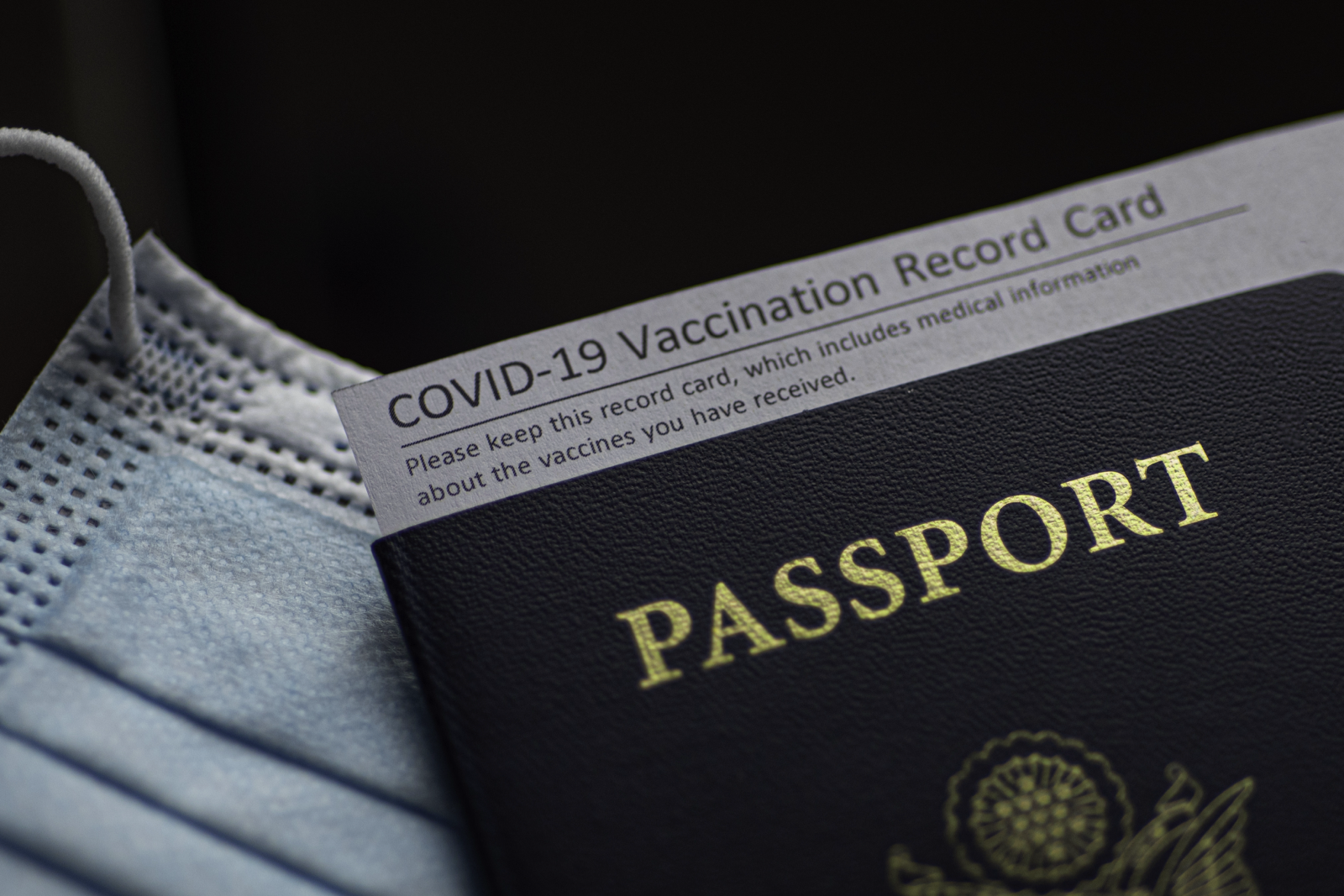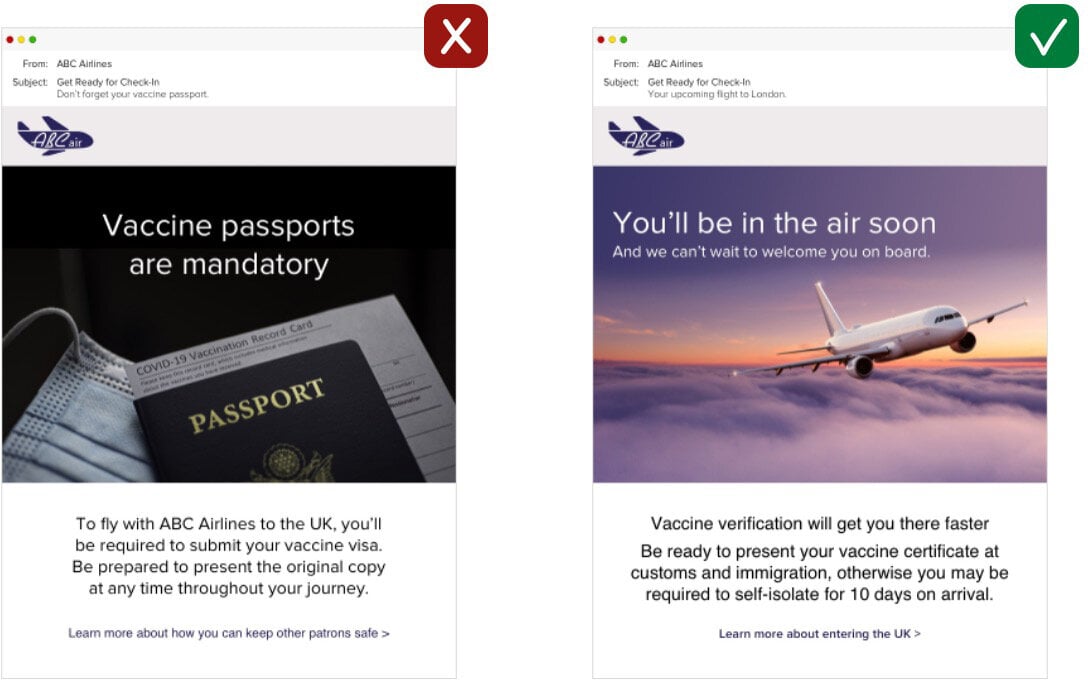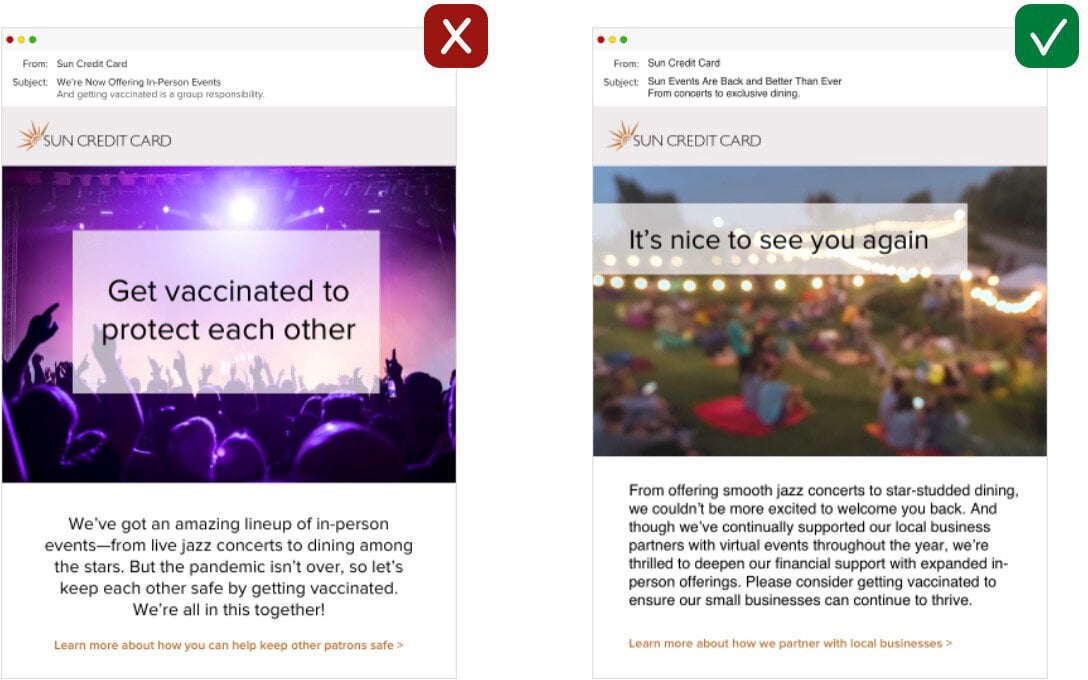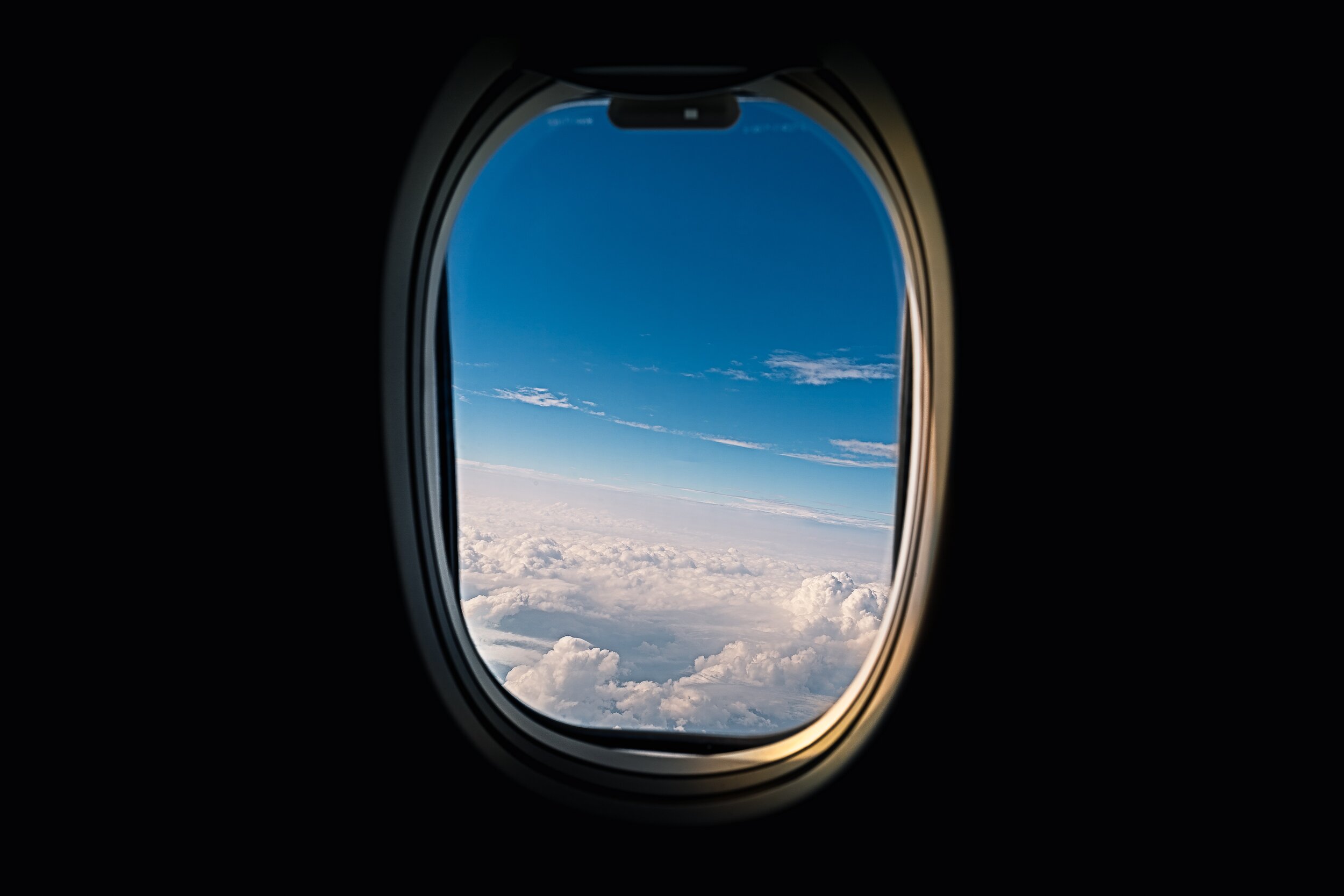Avoiding Travelers' COVID Triggers

After the long pandemic slowdown, travel is returning in fits and spurts. According to the U.S. Travel Association’s June 2021 Monthly Travel Recovery Data Report, 62% of American adults said they felt comfortable taking a vacation. That travel confidence resulted in 66.4 million U.S. airline passengers in June—marking a dramatic increase from 16.4 million passengers in June 2020, and the pandemic low of 3.0 million in April 2020 (the lowest monthly total in Bureau of Transportation Statistics records since 1974).
But fall travel is experiencing some turbulence. Due to the rise of the Delta variant of COVID-19, an August 2021 Travel Sentiment Study reports nearly two-thirds of travelers say they’re changing their travel plans, up from 43% two months ago. One in five travelers has postponed trips until later this year, while one in six has rescheduled travel until next year.
Travel brands need to strategically manage the bumpy rebound. Here are some ways brands can avoid getting in their own way by “triggering” negative, off-putting responses from consumers.
Choose your words carefully
Marketing communications for travel brands need to reconcile consumers’ desire to travel with their broader social views—particularly as they relate to COVID-19 vaccination. Vaccines are fueling the travel rebound, but brands need to remember that how they frame vaccination has a significant impact.
For example, a poll by de Beaumont Foundation and pollster Dr. Frank Luntz revealed that Americans are open to the concept of “vaccine verification,” but they’re put off by the idea of a “vaccine passport.” In practice, they’re the same concept. However, in today’s polarized society, the wording brands choose is potentially divisive.
How brands handle consumers’ varying perceptions of COVID-19 and vaccinations in their messaging can be the difference between a reason to believe long-awaited travel is safe—or a trigger to sit out an upcoming trip or even another travel season.
Let data help navigate the way to a successful travel campaign
While first-party data is great, it takes time and is costly. Keep in mind the usefulness of third-party research as part of a data-driven philosophy.
The travel industry and others are constantly monitoring travelers’ attitudes as they respond to the volatility of traveler confidence. Brands can tap into a plethora of research around pandemic-related travel issues to understand consumer motivations and concerns. Leveraging existing research saves your brand time, while helping ensure your marketing communications don’t generate anger or anxiety with your audience.
Stay alert to hot-button issues
Let’s look at this in practice. Using Dr. Luntz’s poll, we’ll consider the two main hot-button topics connected to vaccination.
First, how your brand refers to vaccine requirements taps directly into polarized attitudes toward individual freedoms and privacy. As discussed above, “vaccine verification” is less problematic than “vaccine passports.” Incorporating that knowledge into your communications can remove the sting of that potentially potent issue.

Next, address travelers’ motivation for getting the vaccine in relation to travel. The return to normality appears to drive vaccinations. When asked if the possibility of being able to open up the economy sooner and return to normal travel (i.e., travel as it was before the pandemic) makes them likely to get the vaccine, 51% of respondents answered definitely/probably.
Many consumers respond negatively to language that focuses on moral or community outcomes related to COVID-19 vaccination, preferring messages that focus on the financial outcomes likely to accompany vaccination. According to a report from Pew Research Center, a greater number of Americans view COVID-19 as a major threat to the U.S. economy than the number who perceive the virus as a major public health threat.
Almost three-quarters (74%) of vaccinated adults and 67% of unvaccinated adults believe the coronavirus outbreak is a major threat to the U.S economy; and most vaccinated adults (70%) and more than a third of unvaccinated adults (37%) see COVID as a major threat to the health of the U.S. population.
Armed with that information, consider avoiding “keep each other safe” messaging in favor of encouraging travelers to take a trip to help support local businesses or economies. An Ipsos survey for the World Economic Forum found that 72% of people would believe their local economy had recovered from the pandemic if they saw more tourism in their community.

Remember to factor in other pandemic attitudes
Recognizing pandemic heroes
-
Best practice: Champion the frontline healthcare workers and hospitals
-
Avoid focusing on officials or public health organizations, such as politicians or the CDC
Public perception of the government’s response to the pandemic is politicized and divisive—even reports and guidance from health officials. However, more Americans, regardless of political preference, feel their local hospitals and healthcare providers have responded well to the pandemic. According to a Gallup survey, Americans view the healthcare industry more positively than the federal government. About a third (31%) of Americans have a positive or somewhat positive view of the U.S. healthcare industry, while only 26% have a positive or somewhat positive view of the federal government.
Proximity to others during travel
-
Best practice: Include language about mask requirements or encouraging mask wearing
-
Avoid discussions of group size and gatherings
In public and mass transportation messaging, the emphasis is on self-protection. According to another Pew Research Center report, requiring face coverings on aircraft is perceived as an acceptable response to the outbreak. But asking people to avoid gathering in large groups is more divided across political ideology.
Proximity to others at a destination
-
Best practice: Showcase outdoor or spacious settings
-
Avoid images of people in close proximity
Although Americans continue to see travel and leisure activities as generally safe, indoor attractions and restaurants are viewed as less safe. According to findings from Destination Analysts, since July 2021, the perception of safety at indoor attractions (such as museums or aquariums) has taken a hit, declining from 59.9% to 44.4%. Perceptions of the safety of dining in restaurants has seen a similar decrease, moving from 67.7% to 52.8%.
COVID-19 policies at a destination
-
Best practice: Where applicable, include local policies for travelers (e.g., no quarantine requirements)
-
Avoid imagery of attractions that are closed or have limited services or capacity based on local restrictions (e.g., Rockefeller Center and the Solomon R. Guggenheim Museum in New York City, which are currently limiting their operations)
Travelers are forming perceptions of how welcoming individual locales are to tourists. Most (68%) consider it an important factor. Some (17%) even named specific states—e.g., New York, Texas, and Hawaii—as seeming unwelcome.
Unlocking generational opportunities
-
Best practice: Focus on Millennial and Gen Z audiences
-
Avoid prepandemic stock imagery aimed at more mature and business travelers
After a recent period of decline, Americans are broadly open to travel marketing. Travel readiness is led by Millennial and Gen Z travelers, with 77.1% likely to travel and be supportive of pandemic protocols.
Keep in mind that the world hasn’t changed—it’s in a continuing process of change. It’s amazing how stable the pre-pandemic world seems in retrospect. We need to embrace that our next normal will feature an ever-evolving context for all travel communications.
As the world continues to open up and travelers take to the skies, make sure your brand uses informed messaging to engage consumers effectively by avoiding messaging that triggers their pandemic fears.
Prepared by The Lacek Group’s Travel Quartet:
Jon Fjalstad, SVP, Group Account Director
Charlie Heitzig, VP, Data Intelligence
Joe Rueckert, Senior Director, Strategic Services
David Whitman, VP, Group Creative Director
The Lacek Group is a Minneapolis-based, data-driven customer-engagement and loyalty agency that has been delivering personalization for its world-class clients for more than 30 years—is an Ogilvy company.

